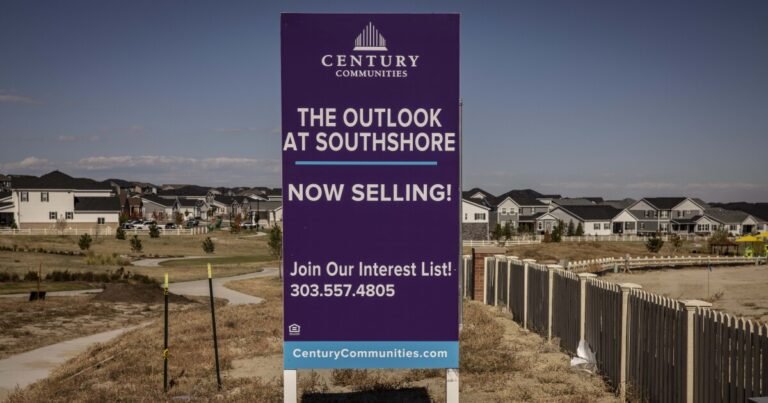A proposed constitutional amendment on Colorado’s Nov. 5 ballot aimed at curbing property taxes would roil municipal financing in the state and harm metropolitan districts in particular, by boosting borrowing costs and sparking litigation, according to bond dealers and attorneys.
Initiative 50, a
Business group Colorado Concern, one of the measure’s backers, contends it and another initiative aimed at lowering property assessment rates, which has not yet been certified for the ballot, would impose reasonable controls on future tax increases.
Bloomberg News
“Initiatives 108 and 50 are needed because lawmakers have failed to take the state’s property tax inflation crisis seriously,”
While “well-intentioned,” Initiative 50 raises many questions, according to the Colorado Municipal Bond Dealers Association.
“The initiative leaves out critical details as to how the statewide property tax cap would be implemented, how it is to be applied to individual local governments that use property taxes for support of operations and capital expenditures, and how it relates to voter-approved general obligation debt, creating uncertainty in the marketplace for various municipal obligations,” the group said.
The restraint on property tax revenue “will have an impact on the credibility of many local governments in the marketplace, raising their cost of borrowing, reducing the amount of bonds that can be issued, and slowing the flow of capital to Colorado,” it added.
Kyle Thomas, a managing director at D. A. Davidson & Co and a member of the executive committee of the Metro District Education Coalition, a network of experts on Colorado metro districts, said state lawmakers would have to step in to enact some sort of framework for implementing the measure should it pass.
“I would say the worry is, if there is a statewide cap on revenues, that there could be an impact, broadly speaking, on any governmental entity that is levying property taxes to provide services or to service debt,” he said.
In a July Piper Sandler update, Zach Bishop, head of Special District Group Public Finance Investment Banking, said the measure lacks clarity on several key points that would have important impacts on the underwriting of future local government debt. He also raised concerns about significant impacts on Colorado’s housing market, including exacerbating the current housing shortage.
Eight law firms penned a letter to the heads of Initiative 50 backers, Colorado Concern and Advance Colorado, that highlighted risks for the approximately $10 billion of outstanding bonds issued by Colorado’s more than 2,200 metropolitan districts, which
“The introduction of a new and significant risk factor, such as requiring an election in order for metropolitan districts to meet their obligations to set the mill levy they pledged to impose at the time of issuance of the bonds, is a material risk that bondholders likely will not want to assume,” the letter stated. “The impact on the trading and pricing of bonds, not only the bonds already in the market but those that are proposed to be issued in the future, would likely be severe.”
The law firms warned that impaired contracts will result in “litigation brought either by bondholders to enforce their existing bond documents, or by taxpayers in the event the districts attempt to impose their mill levies in accordance with such contracts.”
Nearly 200,000 signatures
If it makes the ballot and is passed by a simple majority of voters, Initiative 108 would reduce local government property tax revenue by an estimated $3 billion for 2025 taxes paid in 2026, and by larger amounts in subsequent years, according
The state would be on the hook to reimburse about $2.25 billion with $800 million going to school districts and $1.45 billion to local governments, according to the fiscal summary, which noted the remaining $750 million in school revenue losses could also be made up by the state “if the measure is interpreted to require that complete reimbursements be paid to school districts.”
Coloradans for Local Communities, which was launched to campaign against both initiatives, said the measures would undermine local control.
“Local control over our own communities is the Colorado Way, and leaving our towns and cities to beg the state government to backfill these drastic cuts pits us all against each other at a time when we need to come together to solve our biggest challenges,” the organization
The chorus of concern may be pushing state lawmakers and Gov. Jared Polis to take action to circumvent the ballot measures, with local media reporting rumblings about a potential deal between measure backers that could involve a special legislative session. A legislative
“Governor Polis is listening seriously to all parties, including all those who are advocating that the legislature come back into special session to further reduce property taxes, build on the major tax cuts of the last two years, and continue saving people money without devastating our economic competitiveness and the future of K-12 and higher education funding in Colorado by removing measures 108 and 50 from the ballot,” said his press secretary, Shelby Wieman. “We are encouraging these conversations and are hopeful a deal can be reached and implemented to end this debate on property taxes for the foreseeable future while protecting funding for our schools and vital local services.”
Not all parties are on board with legislative action at this point in time.
“The measures are too draconian, and there isn’t enough data on the impacts,” Ann Terry, Special District Association of Colorado CEO, said in an email. “We are not sure a special session solves this issue without the time to be mindful about additional cuts for the fourth year in a row.”
Amid a surge in home values, state lawmakers in recent years have been trying to rein in property taxes in the absence of a mechanism to keep them in check. The state’s 1982 Gallagher Amendment, which strived to protect homeowners from rising tax bills,
The Democratic-controlled legislature passed a bill in May
After the bill’s enactment into law,

